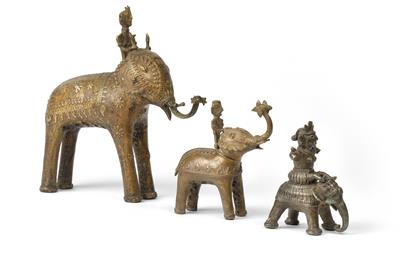Mixed lot (3 items): India: Three ‘Bastar bronzes’ in the form of three elephants with riders (probably local deities).
Mixed lot (3 items): India: Three ‘Bastar bronzes’ in the form of three elephants with riders (probably local deities).

The elephants are decorated with rich, ceremonial ornaments, in the same way in which they are adorned during real ritual processions. The arms of the smallest elephant’s rider are broken.
H: c. 60 cm, 11 cm and 10 cm. (ME)
Provenance: German Private Collection.
In isolated rural regions of India, especially where the non-Hindu tribes (‘Adivasi’) live, wandering founders travel from village to village and manufacture such charming sculptures, upon request, for these tribes. This is the case, for instance, in the villages of the Indian federal states of Orissa, Bihar, Maharashtra, Bengal and others. The small works of art are named after one of these tribes and are an important branch of Indian arts and crafts. The individual pieces are first of all moulded from beeswax and then produced with yellow cast-alloy (brass) in ‘waste mould’ (also known as ‘cire perdue’ casting). Hence, each ‘Bastar bronze’ is an original piece.
additional picture:
‘Bastar bronzes’: An Indian wandering founder at work in one of the tribal villages in Orissa.
Photo from ‘Cire Perdue Casting in India’ by Ruth Reeves
Expert: Prof. Erwin Melchardt
 Prof. Erwin Melchardt
Prof. Erwin Melchardt
+43-1-515 60-465
erwin.melchardt@dorotheum.at
26.05.2015 - 15:00
- Dosažená cena: **
-
EUR 500,-
- Odhadní cena:
-
EUR 800,- do EUR 1.000,-
Mixed lot (3 items): India: Three ‘Bastar bronzes’ in the form of three elephants with riders (probably local deities).
The elephants are decorated with rich, ceremonial ornaments, in the same way in which they are adorned during real ritual processions. The arms of the smallest elephant’s rider are broken.
H: c. 60 cm, 11 cm and 10 cm. (ME)
Provenance: German Private Collection.
In isolated rural regions of India, especially where the non-Hindu tribes (‘Adivasi’) live, wandering founders travel from village to village and manufacture such charming sculptures, upon request, for these tribes. This is the case, for instance, in the villages of the Indian federal states of Orissa, Bihar, Maharashtra, Bengal and others. The small works of art are named after one of these tribes and are an important branch of Indian arts and crafts. The individual pieces are first of all moulded from beeswax and then produced with yellow cast-alloy (brass) in ‘waste mould’ (also known as ‘cire perdue’ casting). Hence, each ‘Bastar bronze’ is an original piece.
additional picture:
‘Bastar bronzes’: An Indian wandering founder at work in one of the tribal villages in Orissa.
Photo from ‘Cire Perdue Casting in India’ by Ruth Reeves
Expert: Prof. Erwin Melchardt
 Prof. Erwin Melchardt
Prof. Erwin Melchardt
+43-1-515 60-465
erwin.melchardt@dorotheum.at
|
Horká linka kupujících
Po-Pá: 10.00 - 17.00
kundendienst@dorotheum.at +43 1 515 60 200 |
| Aukce: | Mimoevropské a domorodé umění |
| Typ aukce: | Salónní aukce |
| Datum: | 26.05.2015 - 15:00 |
| Místo konání aukce: | Wien | Palais Dorotheum |
| Prohlídka: | 20.05. - 26.05.2015 |
** Kupní cena vč. poplatku kupujícího a DPH
Není již možné podávat příkazy ke koupi přes internet. Aukce se právě připravuje resp. byla již uskutečněna.
